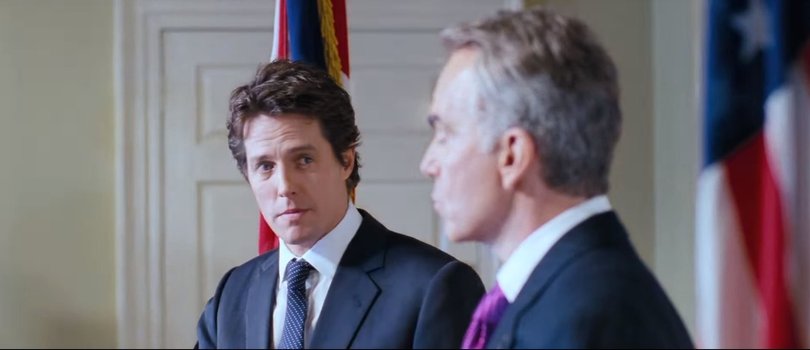BEN HARVEY: Why sucking up to China seems to be Australia’s best option
BEN HARVEY: Rather than stand up to the threat we’re deploying a policy favoured by generations of picked-on school children too little to fight back — sucking up to the bully so he hits you last.
“A friend who bullies us is no longer a friend. And since bullies only respond to strength, from now onwards I will be prepared to be much stronger. And the president should be prepared for that.”
So ended the Churchillian-light speech by Hugh Grant’s fictional British prime minister in an early scene in Love Actually.
In this crowd-pleasingly chintzy portrayal of international diplomacy, the overbearing US president (played by a brooding Billy Bob Thornton) skulks off to Air Force One after being upstaged at a joint press conference.
Sign up to The Nightly's newsletters.
Get the first look at the digital newspaper, curated daily stories and breaking headlines delivered to your inbox.
By continuing you agree to our Terms and Privacy Policy.The British PM is rewarded by the electorate for standing up for “a small country but a great one” and celebrates by rogering his much younger executive assistant without fear of a sexual harassment claim.
Unfortunately for all of us, international diplomacy is more complicated than suggested by a Christmas film directed by Richard Curtis.
Australia’s Department of Foreign Affairs and Trade understands this, which is why our politicians are not calling out China as the bully it has been since 2020.
Beijing has been pushing us around for four years now.
Our crime? Having the temerity to float the idea that it might be good to have an independent inquiry into the origins of COVID.
The subsequent trade sanctions imposed by China were a wild, glass-jawed overreaction to a mild, logical suggestion.
The cyber-attacks and military aggression — blasting of Australian divers with sonar and dropping of flares and chaff in the path of Australian helicopters — that came after the economic retribution? A lot of countries would have considered that an act of war.
How does Australia respond to this intimidating, aggressive posturing?
By welcoming, with open arms, the Chinese Premier and preparing to fete him on his imminent whistle-stop tour of Canberra, Adelaide and Perth.
Anthony Albanese may as well screech “peace in our time” when Li Qiang touches down.
Rather than stand up to the threat we’re deploying a policy favoured by generations of picked-on school children too little to fight back — sucking up to the bully so he hits you last.
The actual world order gives us few other options.
The realpolitik of international relations would have turned Hugh Grant’s foppishly idealistic prime minister into political mincemeat for acting the way he did.

Instead of getting into his limousine with his tail between his legs, the American president would have penalised the junior partner in the “special relationship” by cancelling a consignment of F-16 jets scheduled for the Royal Air Force and suspending negotiations on half a dozen trade deals critical to British heavy industry.
Rather than bop around Downing Street to a catchy Girls Aloud tune, the UK prime minister would have been flooded by calls from Western Europe leaders castigating him for endangering NATO and warning him the Russians would seized on the crack in the alliance to mobilise in the east.
International diplomacy is always nuanced but Australia’s modern relationship with China is mind-bendingly contradictory.
We welcome the hard currency coughed up by students who fly from Shanghai, Chongqing and Shenzhen to study here but eschew investment from State-owned enterprises.
We bank billions of dollars from selling minerals to Chinese factories but fret that those commodities might return to us in the form of intercontinental ballistic missiles.
We implore China to be an active, responsible member of the global community but discourage countries from signing up to its Belt and Rail Initiative for fear the internationalist infrastructure project will create mendicant states.
In our rush to spend the billions of dollars in iron ore royalties paid by Rio Tinto, BHP and Fortescue Metals we don’t stop to ponder the fact that around 80,000 tonnes of that ore was used to create the 50,000 tonnes of plate steel needed to build the Fujian aircraft carrier — China’s newest carrier and the third such vessel that may as well have “Made in Australia” stamped on its hull.
We fear Chinese military aggression now but are deterring those operational aircraft carriers with a fleet of nuclear submarines that won’t be ready for decades, if ever.
How on earth do you construct a coherent foreign policy with all that happening in the background?
Foremost, we must understand why China is so quick to flex its muscles and why it bristles so easily.
To know that we must read our history books. Those pages will show that few places have been as brow-beaten over the past 200 years as the Middle Kingdom.
The Opium Wars of the 19th century, the sacking of Peking that preceded the First World War and the Nanjing massacre that come before the second have informed China’s modern foreign policy.
As is often the case, the bullied became the bully in the pursuit of respect.
It’s in all our interests to ensure Premier Li is afforded that when he touches down on the weekend.

